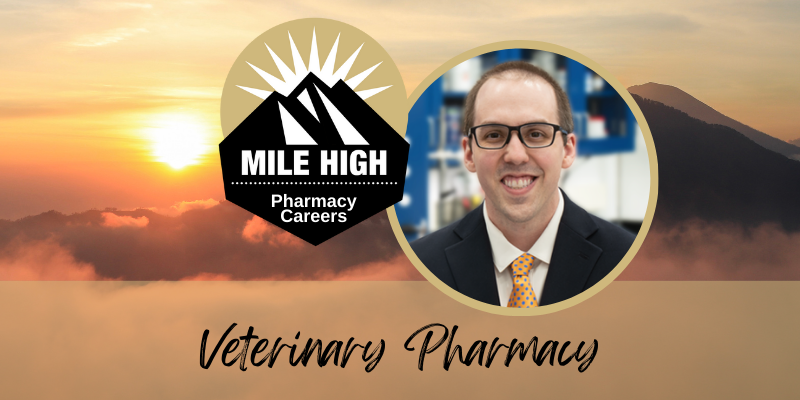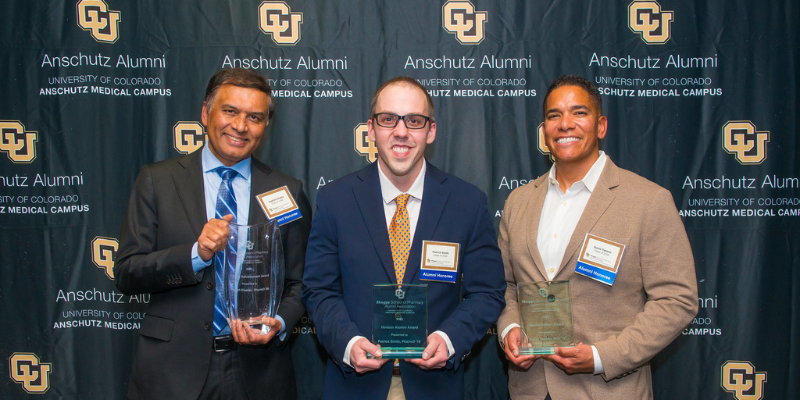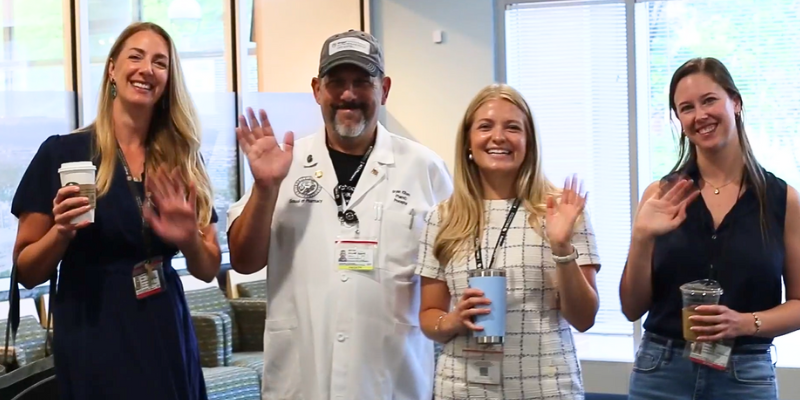CU Pharmacy alumna, Jennifer Kobylarczyk, ’19, describes how she created a path for herself in building a career as a consultant pharmacist incorporating her experience in compounding pharmacy (the process of combining, mixing, or altering ingredients to create a medication tailored to the needs of an individual patient) and veterinary pharmacy (dispensing veterinary drugs, supplies or products and advising owners of companion animals and livestock). Career Services Manager Laurie Sein conducted the interview.
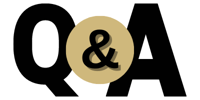

What is your current position and what do you do on a daily basis?
It is a little bit of a hodgepodge of things here and things there which I kind of like. That was one of my biggest challenges in pharmacy school in figuring out what I wanted to do. I had lots of different ideas and interests because pharmacy can be so many different things, so I have been able to curate an interesting consulting practice that centers around a couple different job-like entities.
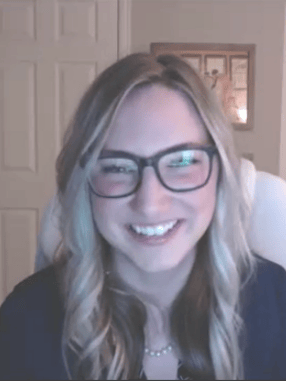
Jennifer Kobylarczyk, PharmD '19 |
The first one, which is my cornerstone job, is I am a compounding pharmacist at a local compounding pharmacy called Wise Pharmacy. I was actually hired there to be a veterinary compounding pharmacist, but I also have been working on my bioidentical hormone replacement therapy compounds and a number of other interesting compound niches. It also has given me a way to practice veterinary pharmacy. I work there a couple days a week. When I'm not working there, I'm at home and I have a couple other projects that I work on.
One of them is I'm a consultant pharmacist for a company I started called Avant Pharm Care, which I'm trying to grow as a consultant-based pharmacy open to non-traditional prescribing roles to try to integrate what pharmacy and pharmacists can do into other up and coming industries. What I mean by that is I mostly target veterinarians as well as, on the other side, naturopathic doctors.
For my consulting practice, I'm still in the early phases of trying to build it up. I'm at the first stage of proving value of what a pharmacist can do earlier in the clinical decision-making process of prescription drugs. This means if they (the consulting client) want to drug-drug check a conventional medicine, which is what you're learning about in pharmacy school, compared to a supplement or a supplement combination of a whole bunch of different things in one supplement product, you are determining if the medications are safe to take together and if incremental minor drug-drug interactions add up to anything clinically significant. I found a really interesting niche in helping early practitioners and ones that aren't necessarily primed with thinking about the pharmaceutical perspective of drug-drug interactions, dosing any other patient specific factors and in helping them come optimize their treatment options.
I've been finding a niche of doing that in two different places of naturopathic medicine and veterinary pharmacy. I do a couple reports in the patient case, consulting projects from my company, and then the last little bit is I am lucky enough to be a writer and a consultant for Plumb’s Veterinary Drugs, which is the biggest and most data backed drug reference for veterinary drugs. If you're interested in veterinary medicine, this is where I would recommend you start because it is comparable to Lexicomp, Micromedex, all of your big human drug references, but it is specific to animals and there's some online references or online databases as well as a hard copy book, which I have on my desk.
I do a lot of different things every week, but those are kind of my three basic ones: compounding, consulting and writing, and doing research for Plumb’s.

What did you experience within the pharmacy school curriculum and outside of the curriculum that helped you develop skills in these areas?
I actually found a lot of value hidden to me at the time in the pharmacy curriculum, which I'm using right now, based off of the SOAP notes and the patient case exercises that start P1 year but then ramp up as you reach P4 year. Every time we were hit with a patient case on a test or on a different practice, making us as students think through the whole prescribing process and make a decision from a pharmaceutical perspective was tons of exposure for how I wanted to practice pharmacy. I didn't realize exactly how special that was until I'm seeing it in real life. Where I don't want necessarily to practice at the end of that spectrum of after a decision has been made, now I'm just checking to make sure that everything is matching the prescription appropriately. That is definitely something that needs to be done, and mostly done in a retail setting. It’s a worthwhile purpose. If you back up in the decision process and you are now peers with the doctor, or you offer a specialist a pharmaceutical perspective, then you can do a lot to optimize where that treatment can go in terms of efficacy and safety. Those are ultimately the two things that it comes down to. All of those practicing SOAP notes actually were fantastic practice for this. On top of my specific niche areas in veterinary pharmacy, I did seek out a couple of special experiences to be able to build up my foundational understanding of veterinary pharmacy because it's a different arena. I've tried to use every opportunity I could in school to supplement our regular human based curriculum with any veterinary activity such as shadowing a veterinarian. With my IPPEs and APPEs, I worked with the School’s Experiential Programs Office to set up an out-of-state APPE rotation at Purdue University’s veterinary hospital and learned a lot about veterinary pharmacy. I got to see a host of animals, which I really enjoyed.
After I graduated, I continued seeking out any Continuing Education (CE) or certificate programs or graduate programs that are offered to help supplement that. There's not much, and there are residencies for veterinary pharmacy, but they're not through the American Society of Health-System Pharmacists (ASHP). They're independent and they're somewhat hidden. So, if you're interested in anything, whether it's veterinary pharmacy, nuclear pharmacy or anything that is considered specialized, you really have to go looking for those. That often starts with a simple Google search or reaching out to the Experiential Office or your professors about where to look for more information. It’s a bit of a self-initiating search, but they are out there and you can find them.
CU Pharmacy really helped prepare me for the clinical side of pharmacy, which is what I define as earlier in that decision-making process where you can offer an optimization perspective for treatment plans instead of later on and making sure the right drug is given at the right time.

Walk us through a typical day for you as a compounding pharmacist and also recall what a typical day was like when you were a student on rotation at a veterinary hospital.
For a typical day as a compounding pharmacist, I'm really lucky because it's an independent pharmacy. I work with the owner who built it up from nothing decades ago. It's wonderful to work so intimately in a supportive environment like that. Usually, I come in and I set up at the pharmacist counter and do all of my regulatory checks to see if anything is left out, or if we need to reorganize the hard copy scripts that were organized last night, and finish up housekeeping in terms of the pharmacist counter. Then I dive into the checks where it's going to be set up like a like a typical retail pharmacy. Except, we have one additional step as we have this beautiful compounding lab where we make everything essentially from scratch. We're also kind of different because we're not set up for electronic prescribing, so the only two ways we get a new prescription is either a physician or prescriber such as a veterinarian can either call in or fax us. I organize with my team anything that has come in overnight and we start processing those new prescriptions. We do an initial check to make sure the prescription makes sense. This is especially significant in compounding pharmacy because concentrations come into account. Volume to be applied comes into account. Plus, there are extra regulatory rules that must be checked to make sure it's a legitimate script.
Once we do all those initial scripts, we enter it into the system and then it goes off into the lab to be made. Usually we can do every prescription that comes in that day. Sometimes it takes a couple days to get it done because it depends on the properties of what we need to make whether it's a really specific suppository versus a mouth rinse that has a different creation time. Then we have a fantastic team of compounding technicians, specialists, and pharmacists who work in the compounding lab to actually create the medication.
As a side, if there’s an opportunity to either do the Patient Controlled Analgesia (PCA) bootcamp offered in the summer, which I did, it’s really fun and I loved it. Or if you can do the compounding elective through CU Pharmacy, that was a fantastic experience to actually get in there and start making different compounds.
Back to the compounding lab, I go in there and I check their math and I check to make sure the ingredients are correct and do another check after it's been made or I help make it. Then afterwards it comes in to get packaged. If it needs to be put in a tube or syringe or a different bottle, however it needs to be packaged, there are regulations to make sure that's right too. I'm personally a little stickler where I really pay attention to how we're providing it to the patient, so I always check to make sure if it's a specific amount. As an example, we had a dosage on a prescription the other day where I wanted to give him a 5-milliliter syringe with an adapter cap and I marked off 3.3 milliliters on that syringe and rubber banded it to that liquid medication. I want to set up the patient for success. Packaging is important to me in setting the patient up for success. So, we package it and then there's a final check that I do for anything that comes out of the lab the ready for package to make sure we actually filled what we said we were going to fill. Usually, everything is fine. Sometimes it's just a quick little fix, so we need to come back to adjust.
Finally, we call the patient to inform them the medication is ready. They come in to pick it up. Then one of my favorite parts is counseling and going over the medication with the patient. Oftentimes, it's their first time seeing a compounding pharmacy; seeing that we have a lab and how we work; and that it's different than a typical retail pharmacy. I really like to take that time and go over all the basic counseling steps that you don't often get to go over in a big box retail chain pharmacy, which is “what are you expecting from this medication?”; “did your doctor talk to you about what we're using it for?”; Potential expectations; side effects; how to use it. It’s so big in veterinarian and compounding pharmacy because this is often not just a tablet that you take. It's a syringe pull or it's a topical that you have to use the syringe to put out a specific amount. So, patient counseling is a last but arguably the most critical step.
I do that all day long on top of some other side product projects of just looking into options we can do for special patient cases and what we can compound. We work pretty closely with PCA consultants and they're great.
As far as my day to day at Purdue, they actually have a veterinary pharmacy residency, so they're uniquely qualified to have great rotations there. They have a pharmacy school at Purdue as well, so they take other pharmacy students there, but I asked specifically if I could come in from out of state. I did have to coordinate an intern license for their particular state and that was pretty easy, but I needed to make sure I did that previously and it was all sent in so I could practice there as an intern pharmacy student.
When I was there, I stayed at an Airbnb that was close to campus. It's a small college town, so it's pretty open to commute. I actually drove out there from Colorado, so I had my car which made it helpful as well. I worked mostly in. the large veterinary hospital. If someone is interested in veterinary pharmacy, I would recommend finding a way to see a big academic veterinary hospital because that's the hot spot of where veterinary pharmacy is happening. It's big in terms of the numbers for department sizes and practitioners as a human hospital. I worked in the internal pharmacy which also had a non-sterile compounding and a sterile compounding suite. The actual hospital had internal medicine, an ICU, and a large animal barn with their own separate departments with livestock coming in. I got to see a goat get his blood transfusion which was very interesting. Then there's more of a small animal section for neurology. I got to work with pets that were doing the underwater treadmill walk where you can't help but cheer them on.
I was even in the ophthalmology department where we actually had a rat come in with an infection in its eye. They had an ophthalmologist veterinarian resident hold it down to get the ophthalmologist device small enough to check on a rat. I observed the medications they use for them.
I mostly worked in the compounding room and made a lot of compounds, but I got to go out and tour with other veterinary students and learn about how the veterinary world operates. It was also good for them to see me and the other pharmacy students because we were there helping guide antimicrobial decisions and other big pharmacy type topics.

You mentioned direct patient counseling as a favorite part of your compounding role. What else would you say is your favorite thing about the various areas where you're involved?
I am surprised that one of my favorite areas is writing and researching. I found pretty late in my pharmacy career that I don't do well in situations where you have to make a quick decision. I did an emergency medicine rotation and I did some other quick-thinking decision activities and I just don't do well in that. I thrive when I have time to analyze and to research and compile an answer to a question. So, the other part of my role with Plumbs, as well as working as a consultant for other providers, and at my compounding job is to get unique patient cases, human or animal, with an administration problem where you have to make, for example, a topical ear transdermal versus a pill for a cat. Then there are challenges beyond administration. I may have a patient who is on a, b and c medications and we want to fit d, but there's a drug-drug interaction or they can't afford a certain medication. Finding that perfect puzzle piece that fits the patient’s need that's also going to be effective and safe for them is really what I like doing the best. It takes time and I like being able to research it.
Then I also like writing about decision-making guidelines or how to organize a decision-making process. At the very beginning of the decision-making process, I'm choosing that perfect puzzle piece for the patient. At the end, I’m counseling them to make sure we're all on the same page and that the patient is going to get the most benefit and the least risk out of optimized medication. Consultant Pharmacy and Compounding are both a good fit for that slower moving, but deep-dive skill set that I personally like.

What were you not prepared for as you were considering career options and starting to develop this myriad of a career path for yourself?
I was not prepared for Community Pharmacy. Part of that is self-inflicted because I went into pharmacy school not having any retail or pharmacy experience beyond being a pharmacy technician in an animal Hospital, which is different from the community pharmacy setting. I completed all of the IPPE hours and experiential activities, but I actively avoided any basic community pharmacy just because I didn't think that was going to be a good fit for me. It's a very important skill for any pharmacist to know the basic workflows of a community pharmacy at how they operate. I'm now working in one, albeit it's a little different in a compounding independent pharmacy, but there was a steeper learning curve than I expected as a pharmacist, understanding when in the process do I check; what am I checking against; and is this something that I should call the practitioner for because I think something else might be better; or is this an instance where I should call this practitioner because it's a safety issue but not necessarily efficacy issue. It’s interesting because CU Pharmacy and a lot of pharmacy schools do a great job and giving you the opportunities to go into a retail setting. There were so many different things I wanted to try that I skirted around community pharmacy and I didn't feel comfortable coming in and quickly learning just basic pharmacy workflows.
Now that I've been in it, I feel more comfortable applying my clinical pharmacist and drug knowledge into what I'm doing, but it was a steep learning curve to figure out things such as which sticker goes where; which prescriptions go in which regulatory pile. You learn all that through pharmacy law class. To actually put into action as a pharmacist was a learning curve.
I came in at a part-time position, so it wasn't like I was thrown in to sink or swim. For a while, I was in and out, so that made it additionally difficult to retain what I had learned and then return. It was two to three months before I felt I had a baseline to go on autopilot and focus on the pharmacist role of checking doses by themselves, instead of trying to do it all at once and make additional workflow.

What advice would you pass on to students or new graduates who are interested in consulting, veterinary pharmacy or compounding pharmacy?
While you're in school and have the opportunity being surrounded by professors and you have a huge support system, they are going to be readier and more able to help you once you graduate. So, I would recommend reaching out and talking to people. Ask questions and ask for opportunities. It could be as simple as expressing interest in something you heard mentioned by a speaker and asking them if there an opportunity to do a research project. There's a great honors program too that I did through CU Pharmacy, which I really enjoyed. Just reaching out and sending a quick note to plant that seed can grow into so many different opportunities from there. Those connections are what's going to push you into the more specialty areas. It does come down to who you know and what you've done. You just have to find your way in there and a good way to do that is getting a LinkedIn page. It is more corporate business focused, but I see a lot of pharmacists on LinkedIn. There's a really supportive community of pharmacists, especially specialized pharmacists like myself who are consultants and other specialists making their own way outside of residency and outside of retail. So, starting off by making a LinkedIn page and finding people who are doing interesting things, is a modern way to engage people and discover new things and new connections. It's scary at first. Networking is viewed as something you have to do thing, but it goes a long way, especially if you're dreaming of a residency and you don't quite match or you're dreaming of the perfect job and you don't quite make it. There are people waiting to help you and you just have to find them.
View the entire interview with Dr. Kobylarczyk and check out other resources available through CU Pharmacy Career Services by accessing Handshake, the university's portal for career guidance. Learn more about activities offered through Career Services by logging in or creating your Handshake account today.
.png)

